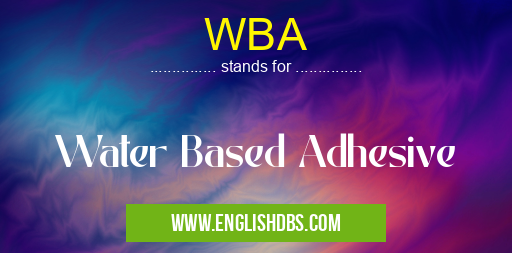What does WBA mean in UNCLASSIFIED
WBA is an acronym that stands for Water Based Adhesive. It is a type of adhesive that uses water as its main solvent. WBAs are commonly used in a variety of applications, including:

WBA meaning in Unclassified in Miscellaneous
WBA mostly used in an acronym Unclassified in Category Miscellaneous that means Water Based Adhesive
Shorthand: WBA,
Full Form: Water Based Adhesive
For more information of "Water Based Adhesive", see the section below.
- Paper and cardboard products: WBAs are used to bond paper and cardboard together in the manufacture of boxes, envelopes, and other paper-based products.
- Woodworking: WBAs are used to bond wood joints together in the construction of furniture, cabinets, and other wood products.
- Textiles: WBAs are used to bond fabrics together in the manufacture of clothing, upholstery, and other textile products.
- Packaging: WBAs are used to seal and bond packaging materials, such as boxes and bags.
Advantages of WBAs
- Water-based: WBAs are water-based, which means that they are non-flammable and non-toxic. This makes them safer to use than solvent-based adhesives.
- Environmentally friendly: WBAs are biodegradable and do not release harmful fumes into the atmosphere. This makes them an environmentally friendly option.
- Easy to apply: WBAs are easy to apply, using a brush, roller, or spray gun.
- Strong bond: WBAs create a strong bond that is resistant to heat and moisture.
- Versatile: WBAs can be used on a variety of materials, including paper, cardboard, wood, fabric, and plastic.
Essential Questions and Answers on Water Based Adhesive in "MISCELLANEOUS»UNFILED"
What is a water-based adhesive (WBA)?
A WBA is an adhesive that uses water as its carrier or solvent. It is typically composed of polymers, resins, and other additives that provide adhesion, flexibility, and water resistance.
What are the advantages of using a WBA?
WBAs offer several benefits, including:
- Low VOCs: WBAs have low levels of volatile organic compounds (VOCs), making them environmentally friendly and safer for indoor use.
- Easy cleanup: WBAs can be easily cleaned up with water, eliminating the need for harsh solvents.
- Versatile: WBAs can be used on a wide range of substrates, including paper, cardboard, wood, and plastic.
What are the disadvantages of using a WBA?
WBAs also have some limitations:
- Slower drying time: WBAs typically take longer to dry than solvent-based adhesives.
- Lower initial bond strength: WBAs may have a lower initial bond strength compared to solvent-based adhesives, but their bond strength increases over time.
- Not suitable for all applications: WBAs are not suitable for use in applications where high temperature resistance or water resistance is required.
What are the common applications of WBAs?
WBAs are widely used in various applications, such as:
- Assembly of cardboard boxes
- Labeling and packaging
- Bookbinding
- Paper crafts
- Woodworking
Final Words: WBA (Water Based Adhesive) is a versatile and environmentally friendly adhesive that is used in a wide range of applications. Its water-based formulation makes it safe and easy to use, while its strong bond strength and resistance to heat and moisture make it an ideal choice for a variety of bonding needs.
WBA also stands for: |
|
| All stands for WBA |
